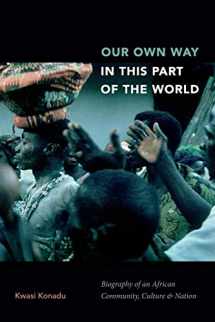
Our Own Way in This Part of the World: Biography of an African Community, Culture, and Nation
Book details
Summary
Description
Kofi Dᴐnkᴐ was a blacksmith and farmer, as well as an important healer, intellectual, spiritual leader, settler of disputes, and custodian of shared values for his Ghanaian community. In Our Own Way in This Part of the World Kwasi Konadu centers Dᴐnkᴐ's life story and experiences in a communography of Dᴐnkᴐ's community and nation from the late nineteenth century through the end of the twentieth, which were shaped by historical forces from colonial Ghana's cocoa boom to decolonization and political and religious parochialism. Although Dᴐnkᴐ touched the lives of thousands of citizens and patients, neither he nor they appear in national or international archives covering the region. Yet his memory persists in his intellectual and healing legacy, and the story of his community offers a non-national, decolonized example of social organization structured around spiritual forces that serves as a powerful reminder of the importance for scholars to take their cues from the lived experiences and ideas of the people they study.


We would LOVE it if you could help us and other readers by reviewing the book
Book review



